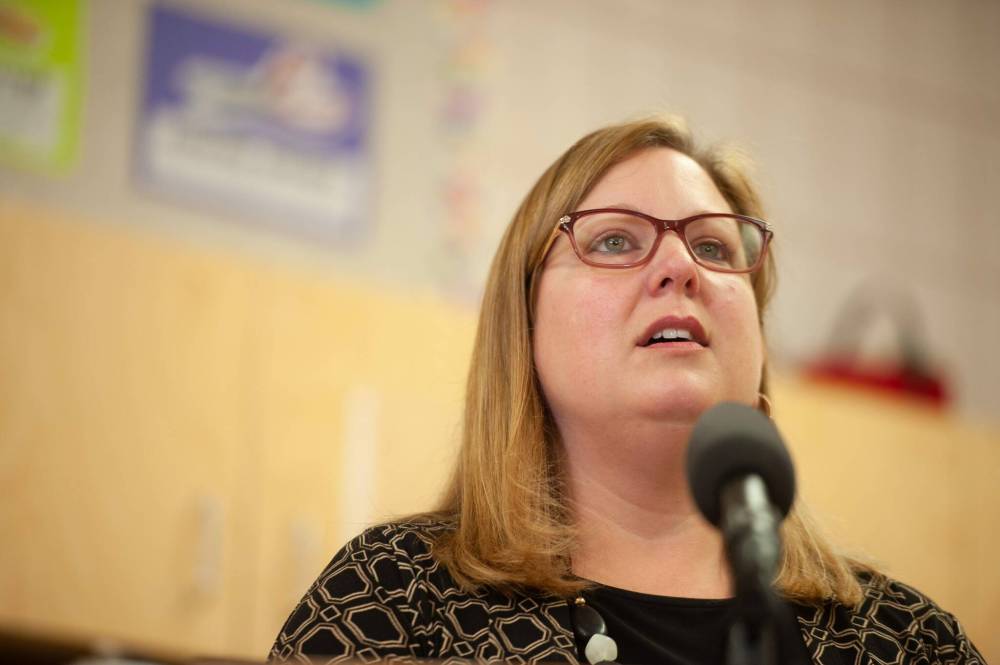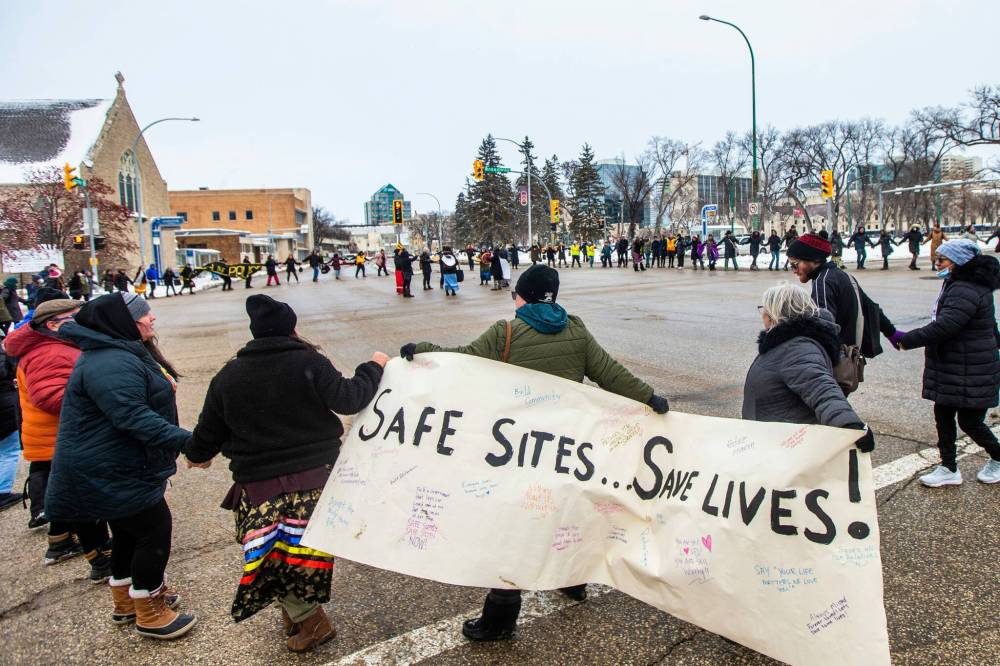Round dance organizers call on province to pivot on supervised drug-consumption site, save lives
Advertisement
Read this article for free:
or
Already have an account? Log in here »
To continue reading, please subscribe:
Monthly Digital Subscription
$0 for the first 4 weeks*
- Enjoy unlimited reading on winnipegfreepress.com
- Read the E-Edition, our digital replica newspaper
- Access News Break, our award-winning app
- Play interactive puzzles
*No charge for 4 weeks then price increases to the regular rate of $19.00 plus GST every four weeks. Offer available to new and qualified returning subscribers only. Cancel any time.
Monthly Digital Subscription
$4.75/week*
- Enjoy unlimited reading on winnipegfreepress.com
- Read the E-Edition, our digital replica newspaper
- Access News Break, our award-winning app
- Play interactive puzzles
*Billed as $19 plus GST every four weeks. Cancel any time.
To continue reading, please subscribe:
Add Free Press access to your Brandon Sun subscription for only an additional
$1 for the first 4 weeks*
*Your next subscription payment will increase by $1.00 and you will be charged $16.99 plus GST for four weeks. After four weeks, your payment will increase to $23.99 plus GST every four weeks.
Read unlimited articles for free today:
or
Already have an account? Log in here »
Hey there, time traveller!
This article was published 17/11/2022 (1117 days ago), so information in it may no longer be current.
Supporters of supervised drug-consumption sites held a round dance at Broadway and Osborne Street Thursday, calling on the provincial government to reverse course and fund the life-saving intervention.
“We continue to see Manitobans die, and we continue to not see action from the province on how to address and stop people from dying today,” said Shohan Illsley, executive director of Manitoba Harm Reduction Network. “We know they’re talking about treatment, but we also know that treatment… and opening up treatment beds is not going to stop people from dying today.”
At least 215 Manitobans died of drug poisonings in the first six months of this year; the province is on track to surpass the record 407 overdose deaths set in 2021.

The round dance at Broadway and Osborne Street was organized to call on the provincial government to support safe-consumption sites and implement seven harm-reduction recommendations outlined in an open letter signed by more 80 front-line organizations. (Mikaela MacKenzie / Winnipeg Free Press)
The round dance at the busy intersection near the legislative building was organized to call on the provincial government to support safe-consumption sites and implement seven harm-reduction recommendations outlined in an open letter signed by more 80 front-line organizations.
The public demonstration came after the Manitoba Harm Reduction Network held a week-long conference in the city with more than 400 people in attendance.
On the first day, an elder called for conference guests to do more and demonstrate to the government that advocates are “seriously committed to interventions that will stop people from dying today,” Illsley explained.
“The elders told us we have to do this because they don’t want another one of their relatives to die, and this is the action that they hope will let the government know that they’re desperate to keep their relatives alive,” she said. “There is a community of folks mobilizing to say, ‘This has to stop.’”
The Progressive Conservative government has ruled out establishing a supervised consumption site in response to the overdose crisis, driven by an increasingly toxic and dangerous supply of street drugs.
Instead, Community Wellness Minister Sarah Guillemard said she “is more firm” in her resolve to support recovery programs over a model shown to reduce harm, including death, for people who use drugs.
“We are going to invest in true recovery. We’re going to help to restore the lives of individuals who don’t deserve to be living on the streets,” Guillemard said, when pressed by the NDP in question period Wednesday to open a supervised site.

Community Wellness Minister Sarah Guillemard says she is firm in her resolve to support recovery programs over a model shown to reduce harm for people who use drugs. (Ethan Cairns / Winnipeg Free Press files)
“The truth is, they’re just disappointed that we didn’t come to the same conclusions that they do about their approaches.”
NDP Leader Wab Kinew has vowed to establish a supervised consumption site if his party forms government in the next election, scheduled for Oct. 3, 2023. He called on the Tories to convene an expert panel on addictions to advise the government.
On Thursday, the Opposition continued to argue the Tories’ decision is based on ideology over evidence after Stefanson erroneously told a local radio show last week that California had such facilities in operation for decades and was reversing its decision because of “unintended consequences.”
“Supervised consumption sites are health-care facilities,” Kinew said Thursday. “Everyone knows that we have to stop treating the addictions issue as a justice problem and to start treating it for what it is, a health-care problem — everyone, that is, except for the premier.”
Stefanson said her government will continue to focus on recovery, repeating a promise to create 1,000 new treatment spaces. The province has provided no timeline to open those beds.
“That is an approach that has a scientific evidence to ensure that we reduce the deaths associated with those who are suffering from addictions problems,” the premier said.
Ideology should not trump evidence when it comes to harm reduction and supervised sites, Illsley said.

The public demonstration came after the Manitoba Harm Reduction Network held a week-long conference in the city with more than 400 people in attendance. (Mikaela MacKenzie / Winnipeg Free Press)
“The assumption is that it’s all people who need treatment, or who would qualify for treatment, who are dying of a drug poisoning, and many of the people who are dying would never access treatment and would not even qualify for treatment,” she said.
“We need interventions that are for everybody, including a safe supply.”
danielle.dasilva@freepress.mb.ca

Our newsroom depends on a growing audience of readers to power our journalism. If you are not a paid reader, please consider becoming a subscriber.
Our newsroom depends on its audience of readers to power our journalism. Thank you for your support.
History
Updated on Thursday, November 17, 2022 5:24 PM CST: Fresh art added


